My diary
13th October 15
I wake early. I've been told I can catch a Bemo which will be quicker than the bus and I should reach Lumbini by 2, which gives me enough time to visit the site in the afternoon. At the bus station I am sent to, there is confusion. The only bus here is the government bus that arrives in Lumbini at 18.30. A few people tell me they can help me, but the price is higher than that which I was told. I feel a little overwhelmed and eventually choose to trust a young boy who leads me out of the station onto a public minibus to a different part of town, paying for me and refusing to let me pay him back. We stop on the side of the road, where a guy is selling tickets to Lumbini at a more reasonable price. He doesn't give me any change but writes refund and the expected amount on my ticket. I have a chai while I wait and buy my companion one. He's starting to get a little creepy, so I'm relieved when the bus turns up.
It's just me in the minibus. We drive a little further down the road where I change from the empty minibus into another filled with passengers, and we're eventually on our way. The bus
Kathmandu to Varanasi
Nepal/India
13th October 15
I wake early. I've been told I can catch a Bemo which will be quicker than the bus and I should reach Lumbini by 2, which gives me enough time to visit the site in the afternoon. At the bus station I am sent to, there is confusion. The only bus here is the government bus that arrives in Lumbini at 18.30. A few people tell me they can help me, but the price is higher than that which I was told. I feel a little overwhelmed and eventually choose to trust a young boy who leads me out of the station onto a public minibus to a different part of town, paying for me and refusing to let me pay him back. We stop on the side of the road, where a guy is selling tickets to Lumbini at a more reasonable price. He doesn't give me any change but writes refund and the expected amount on my ticket. I have a chai while I wait and buy my companion one. He's starting to get a little creepy, so I'm relieved when the bus turns up.
It's just me in the minibus. We drive a little further down the road where I change from the empty minibus into another filled with passengers, and we're eventually on our way. The bus
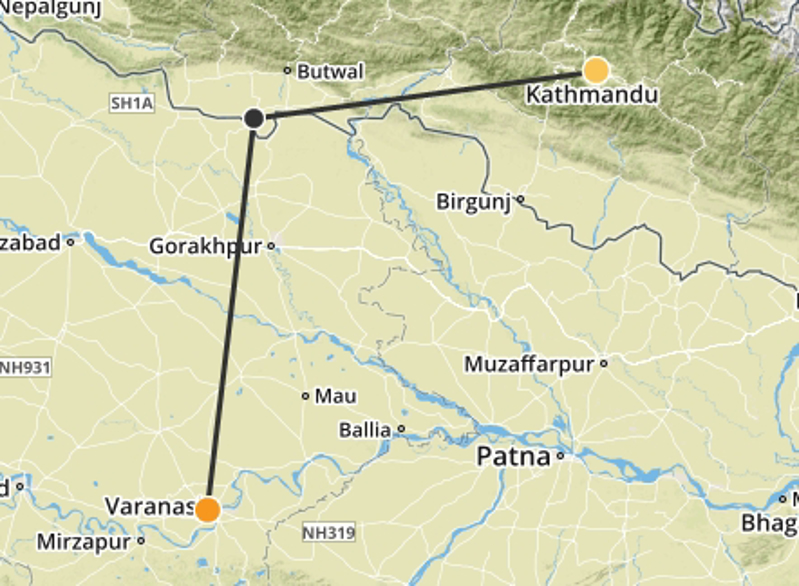
takes a lot longer than expected and we pull into a town near Lumbini at dusk. The driver gives me my change here, which I had been expecting not to get back and points me onto a bus. I have to change twice before reaching my destination. By this time it's dark and the guesthouse I had planned to stay in is full. Instead I stay in a rundown guesthouse next door. The sheets are dirty and when I ask the grumpy lady for new sheets she simply chucks these on the bed and becomes even more moody when I ask her to change the sheets. It's a dirty little town, hardly what I had expected. I don't think I want to stay here an extra day just to visit the temples.
I cross the road for dinner and order daal bhat. 2 guys are chatting in English in the room next door, so I pluck up the courage to join them. They've only just met - one Canadian who also quit his job to travel and an English guy who is my younger brother's age, who's been teaching English in Vietnam for the past year and is now travelling. I drink a couple of beers. The Canadian has visited the Birth Place of Buddha today. He tells me the complex is nothing special, that the temples are modern and he doesn't think it's imperative for me to visit them. I decide to continue my journey tomorrow morning, rather than remaining here another night. I book a taxi from here to the border at their guesthouse as the owner is so much more helpful.
14th October 14
The rain this morning is torrential. So much so that the taxi driver has chosen to stay in bed. The owner of the guesthouse has to drive me himself. It's a short journey to the border town of Sunauli. I change my money to Indian rupees here. The immigration office is a small bare room. Two staff check and stamp my passport while I fill in the departure form. I trudge through the filthy puddles, wet through by now from the sheets of continuous rain under the archway and into India.
A river courses along the dirty street. I attempt to keep to the side walk which keeps disappearing where pieces of pavement have cracked and disintegrated. I try to avoid the piles of litter, barely visible beneath the surface of the water. There are no other tourists here and the people glance at me with disinterest in this miserable town. It feels very different from my recent experience in Nepal, where every local we met almost fell over themselves to assist us. Perhaps it's because everybody knows I won't be staying, so here there are no dollar signs glittering above my head. Everyone who I ask for directions to the bus, points vaguely ahead. The 8 o'clock bus straight through to Varanasi does not appear to exist, so instead I locate the bus to Gorakhpur. I leave my bag on the bus to find some breakfast, slightly worried that it will leave without me. A little shop serves luchi (fried round pieces of bread) with a chickpea curry and chai tea. I can't quite relax and continue to stand up and look down the road to check the bus is still there, much to the restaurant owner's bemusement.
It's a government bus and a little rickety with old age. Once it has filled up, the journey begins. The landscape is flat but the roads are horrendously bumpy, so progress is slow. On reaching Gorakhpur, the rain is still monsoon heavy. It's a busy city, bursting with beeping traffic. I start to make my way past the buses lined along the road, desperately asking people for a bus to Varanasi. People shake their head and turn away from me, either not knowing the answer or not understanding my question due to my bad pronunciation of the city. Two teenagers, wanting to practice their English, approach me. I ask them for help. They steer me onto an empty, stationary bus to wait in its shelter, while they attempt to locate a rickshaw for me. I watch them running across the road. Eventually they manage to flag down a rickshaw and tell him to take me to a bus station in another part of this sprawling city. I sit behind the cyclist, beneath the pounding water, my clothes and bag absolutely dripping, feeling a little sorry for myself. At this station, after much questioning, someone who speaks English is able to tell me the time of the bus. I sit down to wait and buy a snack from a street vendor - a samosa broken up and layered with a flavoursome sweet and spicy sauce and curry. A crowd of men watch me with curiosity. I'm desperate for the toilet so I risk leaving my bag on the bus, and find a dirty squat toilet at the back of the station but I am grateful this facility exists. I locate a seat on the bus, but soon realise this space is vacant as it's next to the open door and once the bus starts moving I am splattered with water droplets carried in my direction by the wind. I move seats. A large man sitting in front of me, changes his shirt, hanging the soaking shirt up on the luggage rack to dry. The bus stops for an hour in a traffic jam. We pull into various stations and wait, at one of which I am able to jump off and grab a snack. I've no idea how long it will take to reach Varanasi and it's not long before nightfall. I'm beginning to worry about turning up in an unknown city in the dark, with no current destination, so I send a text message to Val, who replies with the name of a hostel and tells me they will meet me in a well-known location.
We eventually pull into Varanasi at 9pm. I take a tuk tuk, after first trying to haggle down the price to no avail, although I have no idea whether the current price is fair. I wait standing with my rucksack on the street, lurking in the shadows outside Bengali Tola college, where I have arranged to meet Val and Hannah. Every passing tuk tuk stops to ask my destination. They don't understand my response, so wait a while hopefully before moving on. I'm relieved when Han and Val arrive to collect me. We enter the old city of Varanasi on foot - the galis too thin for any vehicle. The narrow streets and dark alleyways are disorientating. They are paved in old stone with rubbish piles every few metres. The huge, beastly cows blocking our path are disconcerting. The whole experience, discombobulating. We eventually reach the hostel with the use of a torch to pick our way over the cobbles and dirt and to illuminate dogs lurking in the darkness. The hostel is called Eden Halt. It overlooks the Ganges, but it's too dark to see. The room is simple yet clean. I'm hungry now, so the girls walk with me past more cows, metamorphosed into monstrous creatures beneath the cover of darkness, to try and find food. Everywhere is closed, so I buy Maggi noodles and chocolates from a small convenience store and ask for some hot water back at the hostel. They kindly make the noodles for me and then spend 15 minutes trying to locate a fork as they normally eat with their hands, so don't own any cutlery. Had I realised, I wouldn't have put them to such trouble. We stay up chatting and catching up before bed. It's wonderful to see Val after so long. She's shattered from her journey, bewildered by the madness of the India she has just stepped into, but excited for her holiday ahead.
15 October 14
We step out of our room and see ahead the large doorway open onto the Ganges stretching wide and calm to the pale yellow, sandy bank on the further side, small trees lining the horizon, the colours washed out like a water colour in the misty morning light. From the roof of
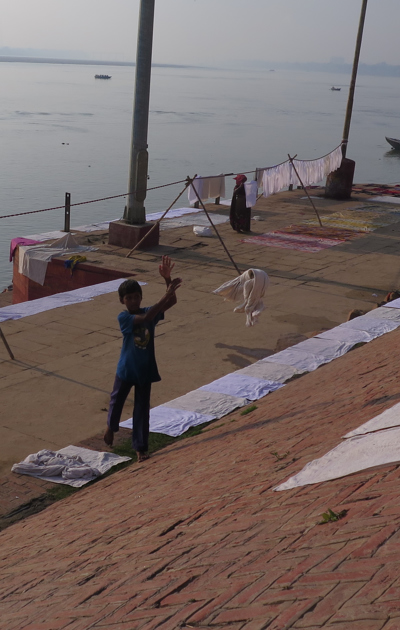
the guesthouse, we watch the strength of men twisting, and then smashing sheets and clothing onto the concrete in the river in repetitive motions. They stand waist deep in the river. Boys lay out sheet after sheet upon the slope of red bricks below us to dry. A vast canvas of white being bleached by the sun.
We walk through the tiny alleyways, exploring the old city whilst seeking out a nice breakfast spot. We locate a guesthouse with a rooftop overlooking the river. It's a little run down and the view is ruined by metal fencing that I assume is in place for security reasons, but it makes the restaurant feel a little like a cage, with us the animals trapped inside. I have muesli curd and fruit, scattered with gems of pomegranate. 2 men start pulling apart old wooden furniture in the same room to use its wood for some other purpose. The bashing of the hammer is hardly conducive to a peaceful breakfast.
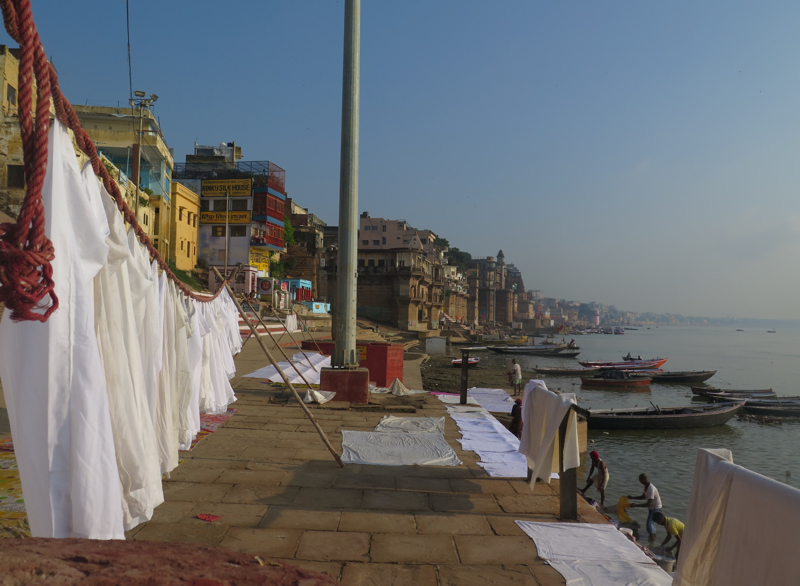
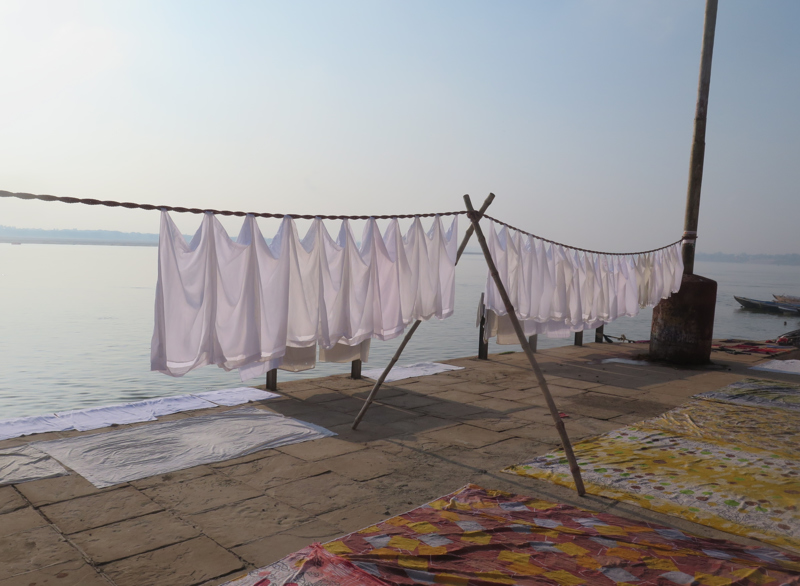
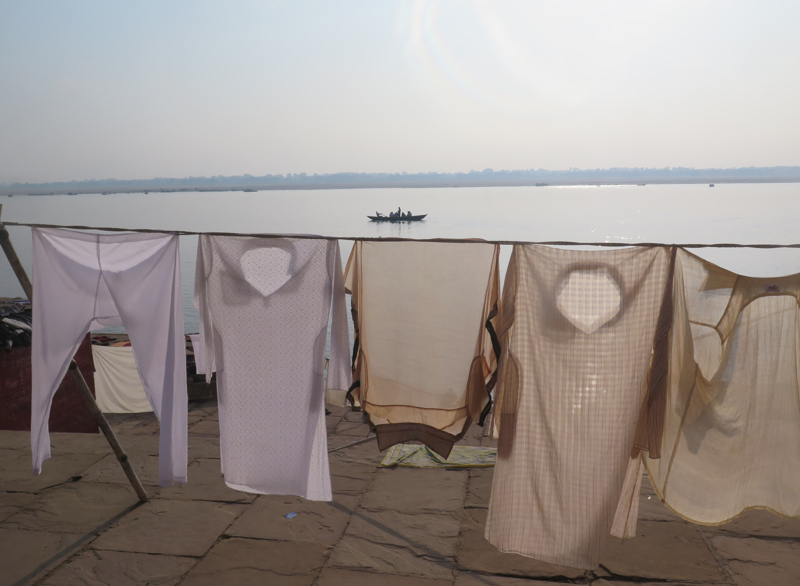
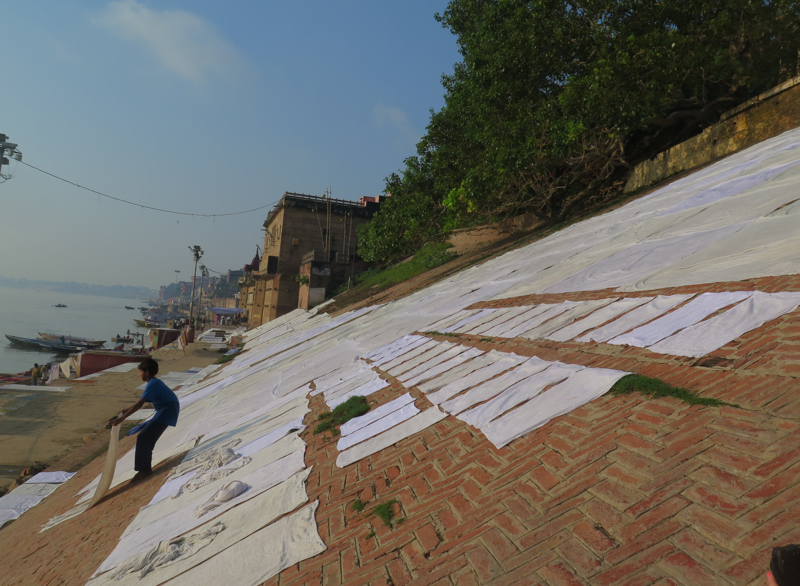
We walk back into the chaotic labyrinth of alleyways, jammed with bicycles, carts and people squeezing past the stationary cows. Vendors sell snacks from little carts. Restaurants, and shops selling clothes, scarves and musical instruments for tourists, are crammed into small spaces. A newspaper vendor sits in a little room below the ground, with his head sticking out just above the street level, like a jack in his box. The walls are dirty and decaying, but there are some beautiful old buildings with intricately carved arches and columned doorways.
We make our way out of the maze down to the river via the worn stone steps of one of the many Ghats onto the stone walkway that runs alongside the water. Despite, the craziness, there is a mystical sense of peace and serenity here. An inexplicable feeling of
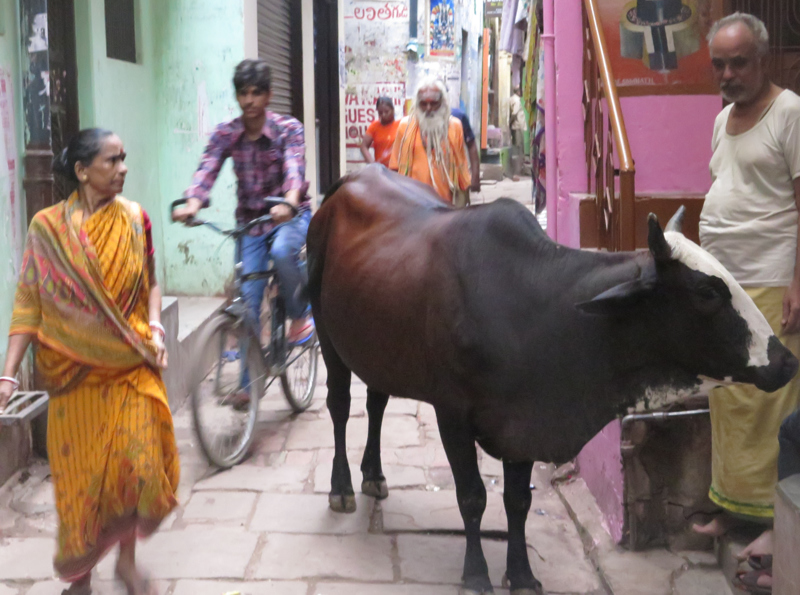
spirituality envelops me, although I am not religiously inclined. The buildings along the waterfront really are magnificent. Some like turreted, castle fortresses alongside Hindu temple-like spires. The steps leading down to the waters edge are adorned in a geometric pattern of leaf shapes, their points shaping downwards. The decaying walls are decorated in arty graffiti, faded from the water in monsoon season. The lower level of an old Ganga Silk Factory is filled with a mound of slanting mud that must have been deposited after flooding, partially blocking the entrance and reaching the ceiling at the back of the room. We understand that the annual flooding causes a constant battle for the buildings, hence the ancient looking stonework despite only being 200 years old. A modern, poorly built hotel stands on the waterfront with gaping rectangular holes in its walls.
Locals and pilgrims are bathing in the filthy waters of the Ganges - lathering their bodies in a layer of white soap. Others are swimming, playing, splashing around, squirting dirty water happily out of their mouths. Ornate, circular parasols, their tops shaped like smarties, covered in colourful materials, adorn the stone steps. People relax underneath them, as protection from the sun. A man balances precariously high up on bamboo scaffolding, holding a pot of paint, adding finishing touches to a mural. His figure is miniature in comparison to the gigantic form of the Hindu deity depicted here. Cows lounge in the sunshine as if they own the place.
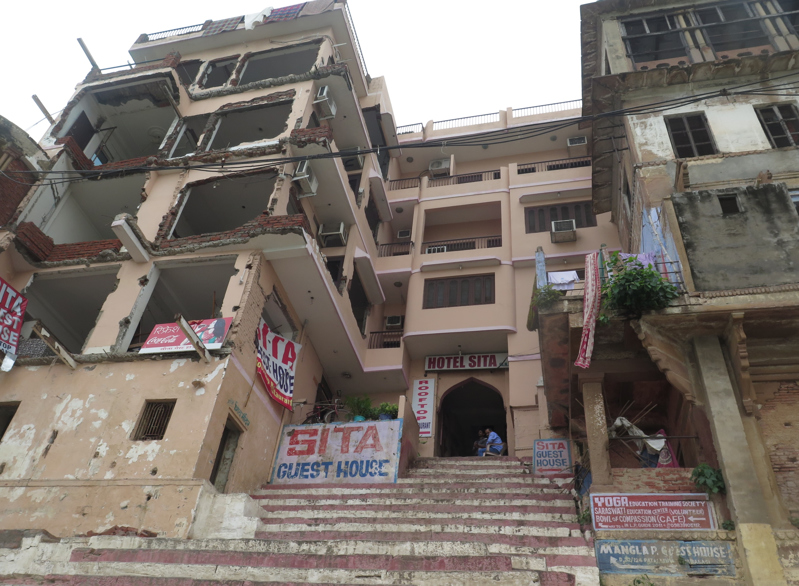
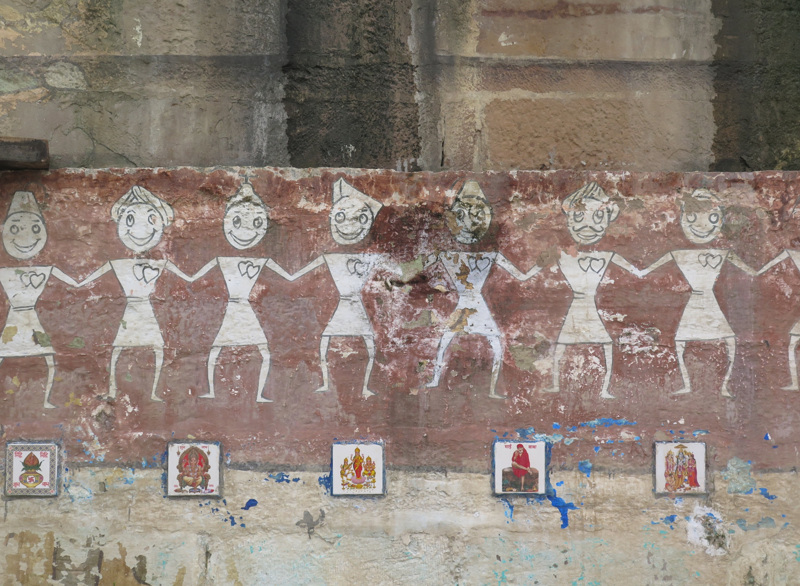
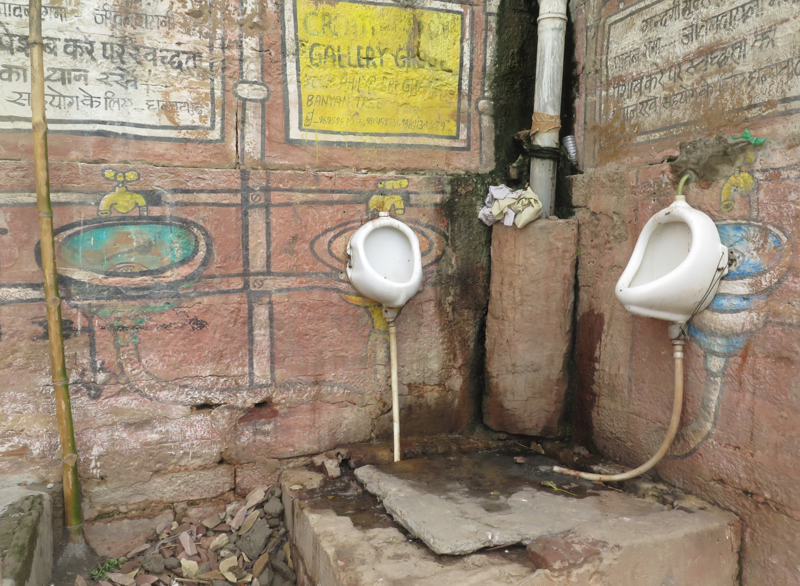
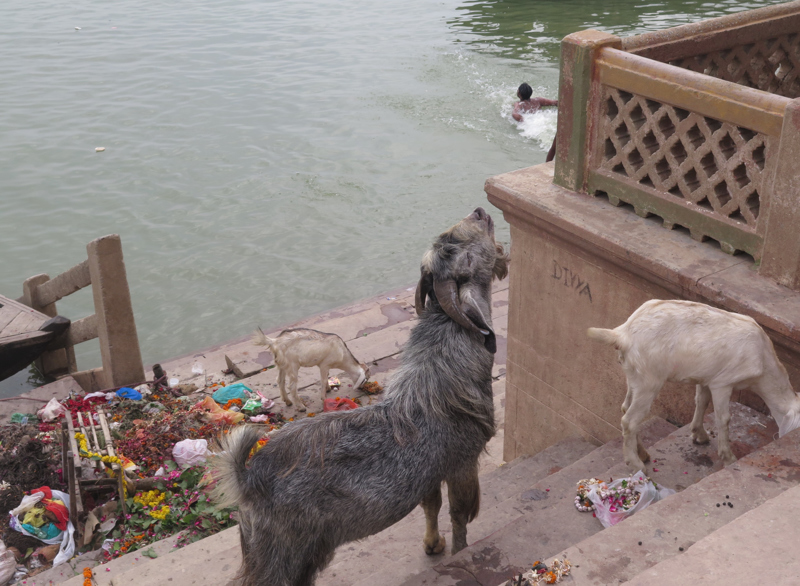
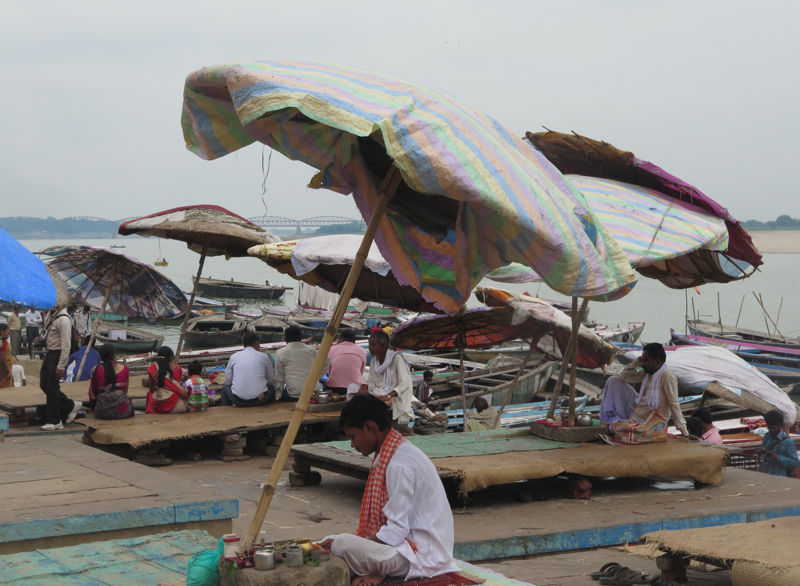
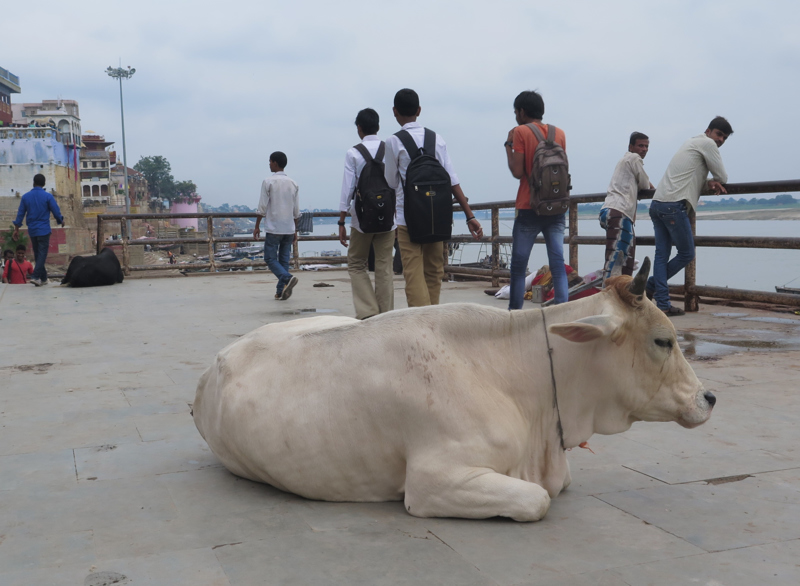
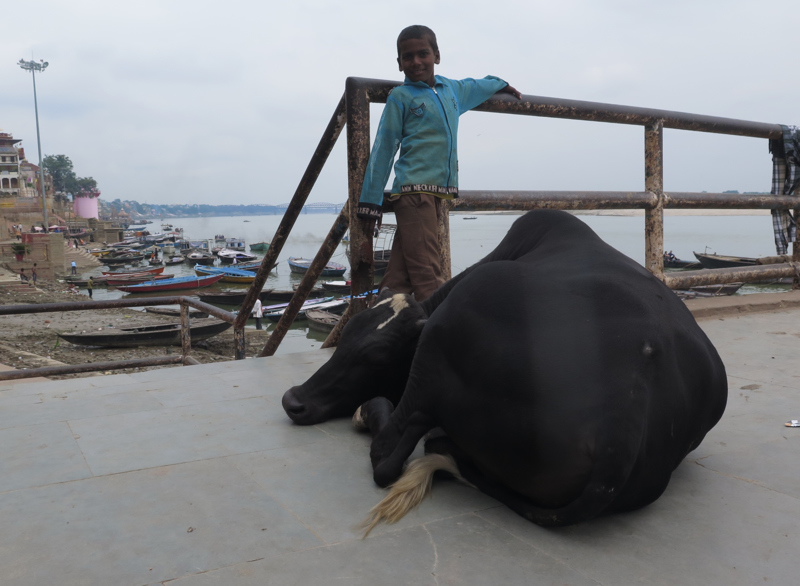
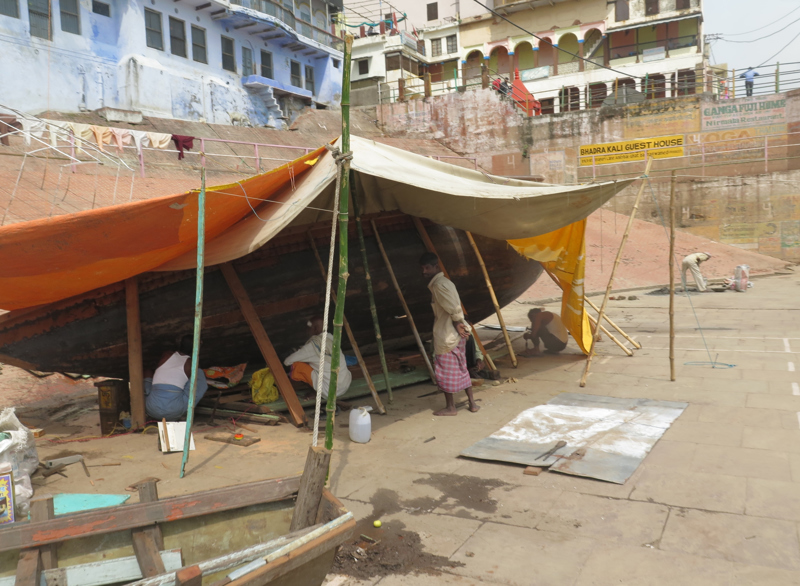
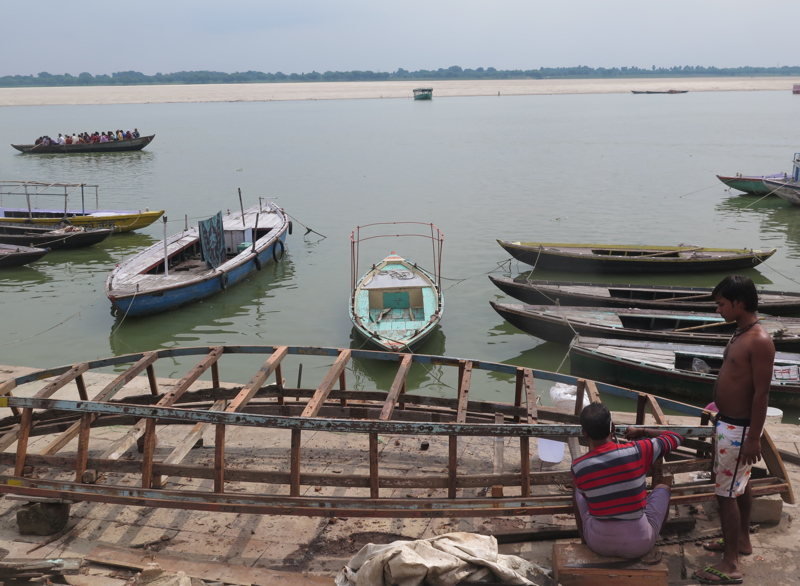
Children are working trying to sell tacky goods - paints, stickers, silly toys. One young boy holds a basket with his cobra, hoping for payment for a picture.
We stop in a restaurant for lunch, which sells Western food and overlooks the river. We choose curries to share. The food is a bit overpriced in comparison to its quality. A girl walks into the restaurant, dressed elegantly with an Asian twist, an SLR camera slung around her neck. I recognise her and we both stare at each other with confused expressions on our faces, before breaking out into smiles. It's Sarah, a friend of Sophia's. We've already finished lunch, so we arrange to try and catch up in Varanasi either this evening or the next day.
We continue our walk along the river, past the many ghats, now
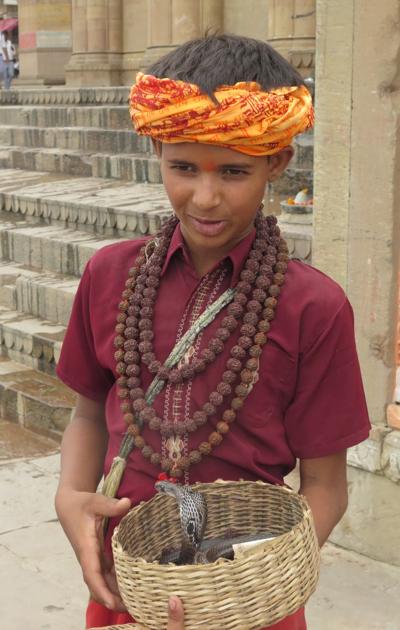
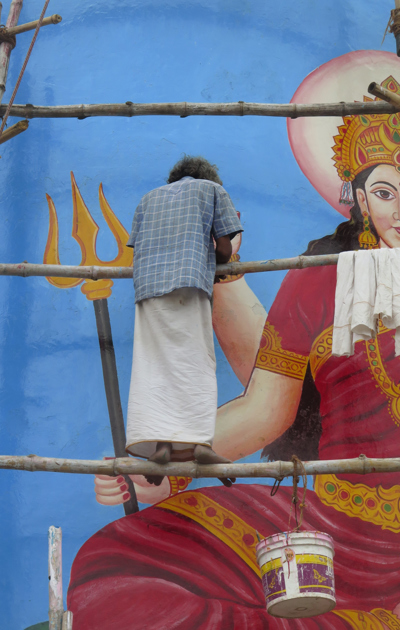
approaching Manikarnika Ghat. A man falls in step with us, chattering away and he's impossible to shake off. He keeps on reiterating he's not trying to be our guide when it is very clear that he is. This ghat is where the funerals take place. The steps are slippery with mud as we near the cremation area. He warns us to put away our cameras, as the mourning families will be understandably angry. He says that yesterday, someone broke a tourist's camera for taking intrusive photos. It is a little morbid that this ghat has become such a tourist attraction. We follow him up the steps away from the funeral, past neat wooden logs piled high, where men are chopping the wood with their axes. He leads us into a windowless old building, blackened and grimy from the surrounding smoke. There are 2 men sitting in the shadows of the stairs - their limbs suffering from leprosy, their eyes hungry. We pass through a room, bare of furniture, where women are crouching, rocking backwards and forwards. They want money, but throw our proffered note on the ground in disgust. It is not enough. We must donate enough to buy wood for one pyre, or nothing. The building has fallen into disrepair, but it oozes history. It feels like a squat, although we don't know if these people live here. We're led onto the roof of the building, the theatre box from where we can watch the performance below.
Dead bodies are carried, wrapped in orange cloth, similar to the funeral we witnessed in Kathmandu. We can feel the heat from the
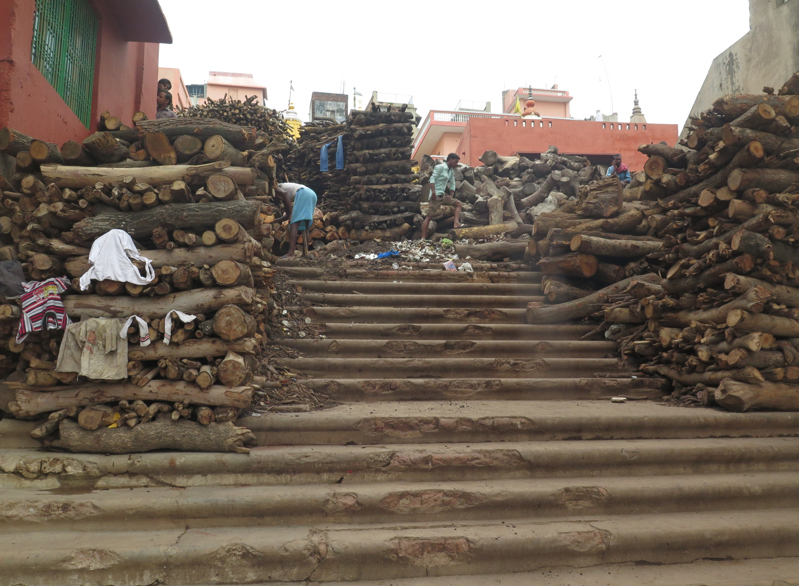
burning funeral pyres below. Lingering smoke wafts upwards. The water is black with ash at the rivers edge, where the untouchables wash the bodies and the buffalos stand knee deep. The woodman who has followed us up here is hoping for a tip. He gives us an explanation of the procedures below, but I drift off and only Val has listened. This is the most auspicious place for a Hindu to be cremated, so people travel far and wide to carry their relative's dead bodies here. There are only a few people whose bodies cannot be cremated: the untouchables, sadhus, pregnant women and those killed by a cobra, if I remember correctly.
Our 'guide' wishes to take us to his boss' shop and since Val is interested to look at scarves, we comply. In a little courtyard next to the shop is an underground Hindu temple. He takes us down the steps and chants prayers which he wishes us to repeat and allows us to ring the little bell. It's slightly farcical as we're unable to sing the words correctly and we stifle giggles. In the shop, we drink Masala Chai while colourful scarves and saris are unfolded and lain out in front of us. Val buys two delicate, expensive pashminas, so we avoid the awkwardness of leaving the shop empty handed.
We head back to the guesthouse to shower, but we quickly become lost in the maze of alleyways. We pass a strip of buildings painted angry red before turning a corner into
a line of calming blue painted houses. A little girl pokes her head cheekily through a hole carved into her balcony above us, like a porthole on a boat. We make our way back down to
the river to locate our whereabouts, only to discover we have walked much further along the river.
In the evening, at sunset, we watch the Ganga Aarti ceremony at Dasaswamedh Ghat, that occurs daily. Hindu pilgrims and tourists
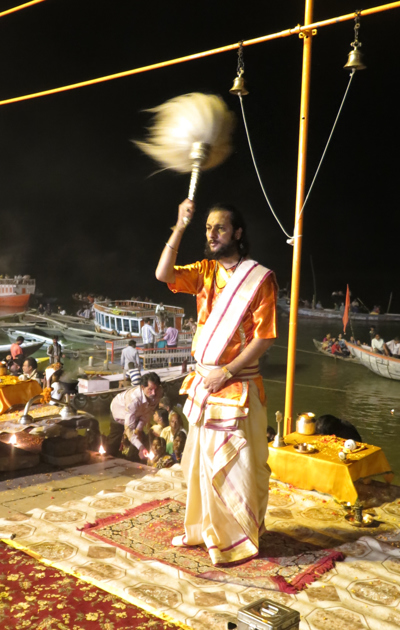
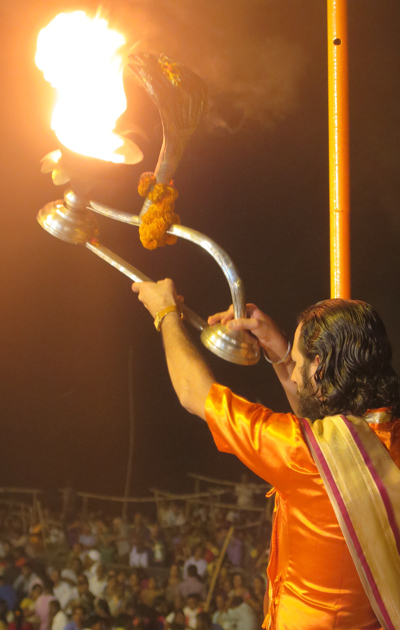
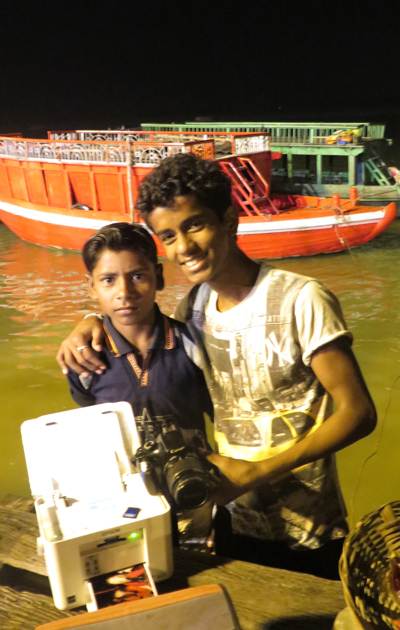
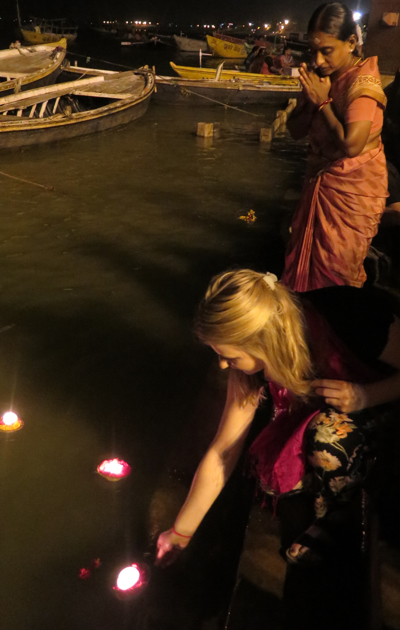
fill the steps and surrounding boats to watch. A man sings accompanied by instruments and the sound of bells chiming, which men are sounding by pulling the long strings attached. Priests dressed in orange silk tops stand on raised platforms, laid with ornate carpets. They lift golden lamps of fire, turning around to face the whole audience, their movements synchronised. They throw flower petals into the air like confetti and wave around what looks like a feather duster. Children are selling candles on a bed of flowers in a little paper bowl like a cupcake holder. We buy one to place onto the water, and watch them as they join the other pretty yellow lights floating on the Ganges - gifts of worship to the sacred river. An enterprising young boy is selling photos her. He has an SLR camera and a little printer, so we buy a photo of the three of us from him.
For dinner we eat on the rooftop at Shanti Guesthouse, with a view overlooking the city. The curry is excellent. We're served beer in
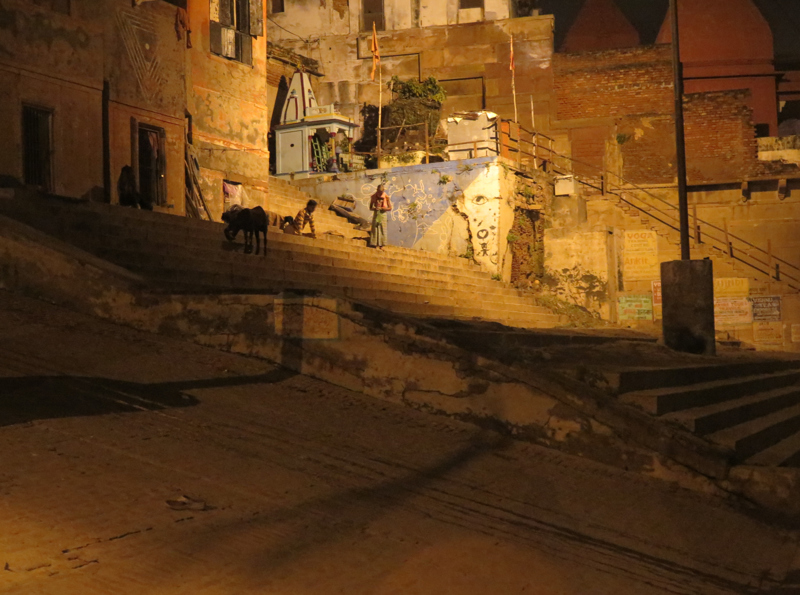
metal teapots, so this illegal activity can't be caught on CCTV.
16 October 14
We wake early to watch the sunrise from a rowing boat. There are lots of tourists, both Indian and Western doing the same. Our boatman rows down the middle of the Ganges with the current. The red sun rises slowly out of a line of mist above the silhouettes of trees. It shoots a strip of fire towards us from the bank, washing the sky and water in a glow of orange. As we near the buildings on the far side, the yellowy orange stone of the buildings dazzle, awash with golden light. Our boatman rows back along the bank, his facial features tensed from the effort of rowing against the current. Bathers are washing and soaping in the morning light. Others calmly sit cross legged on the steps, their eyes clothed in meditation for Puja, the prayer to the rising sun. We pass the ash and burnt pyres of the
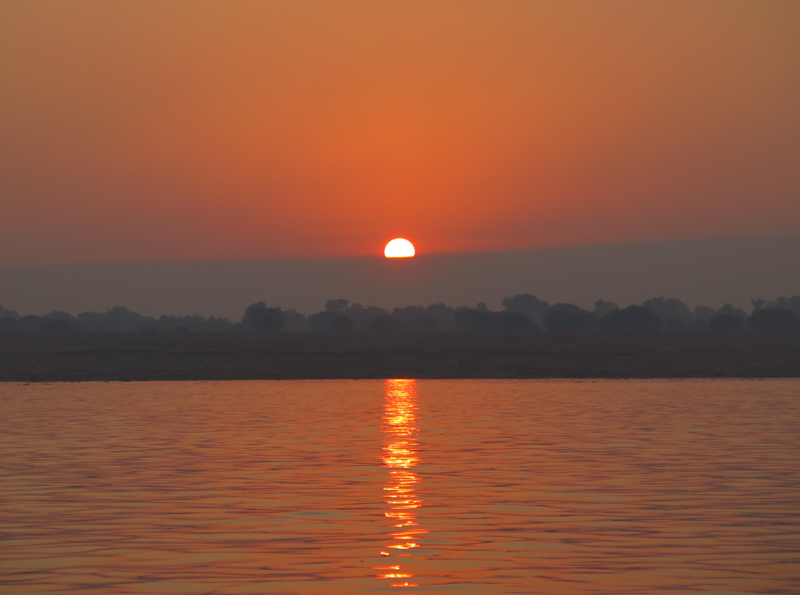
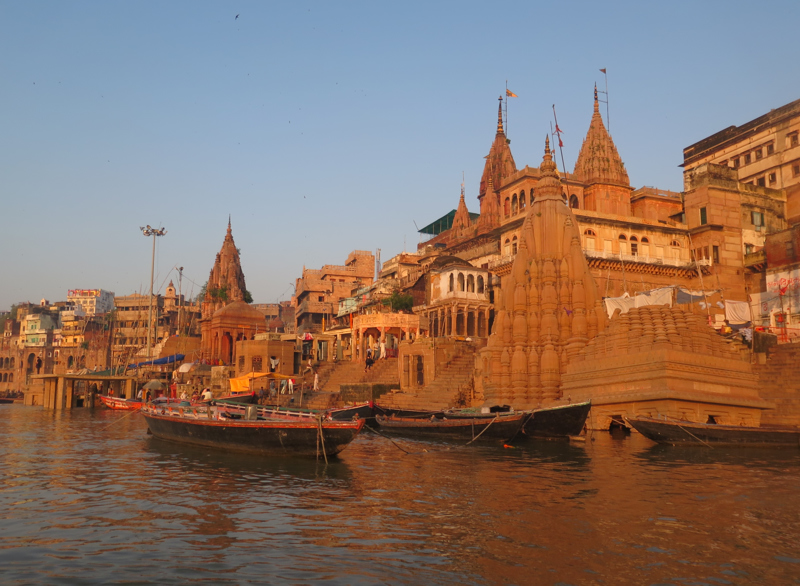
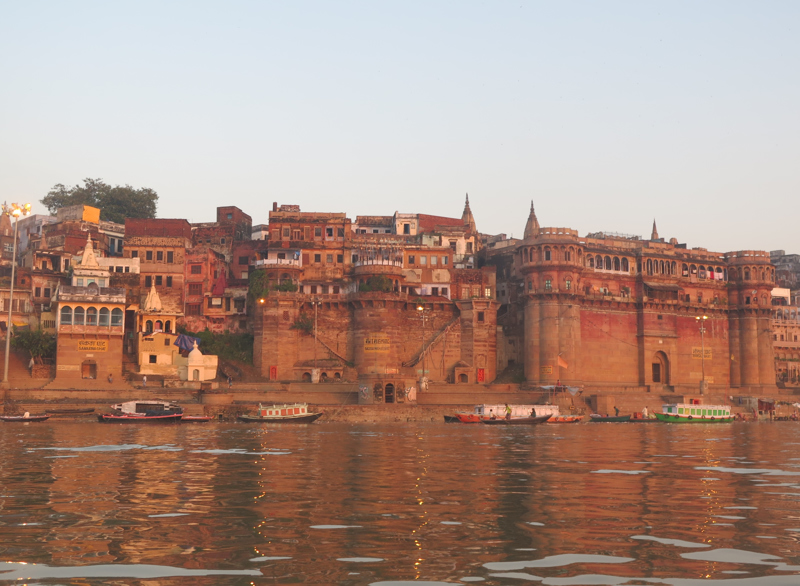
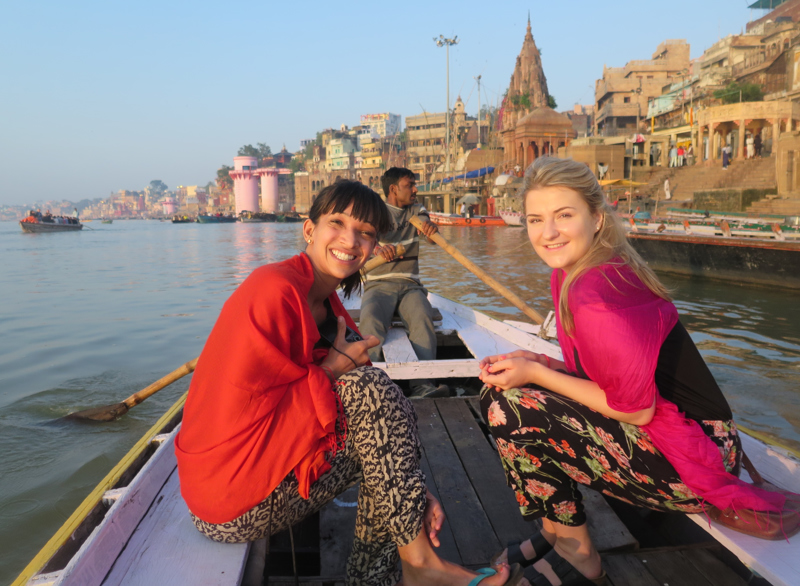
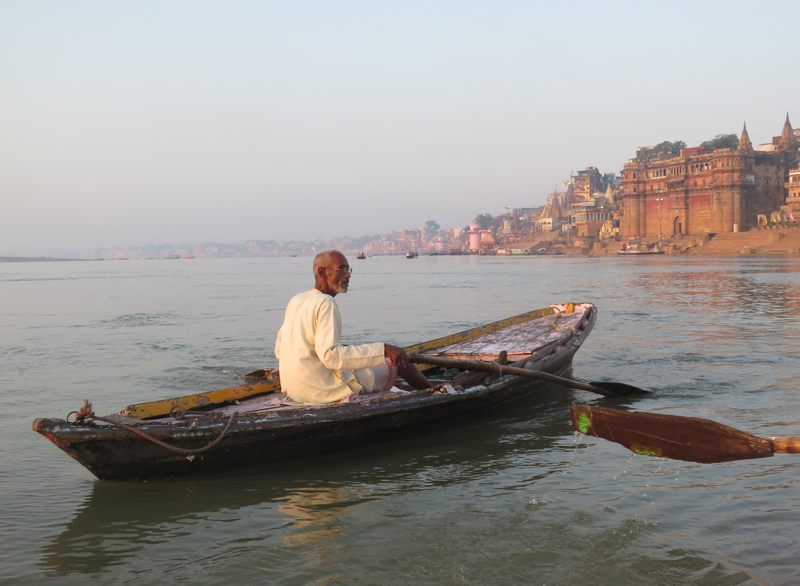
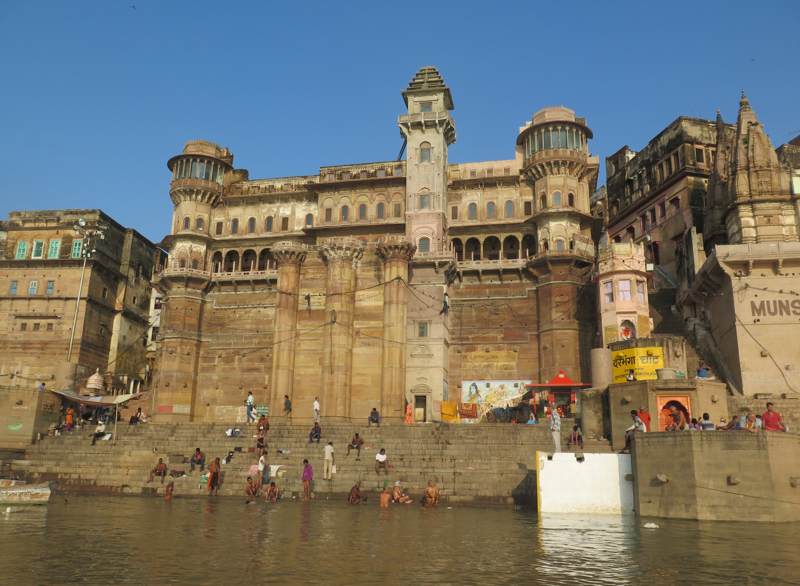
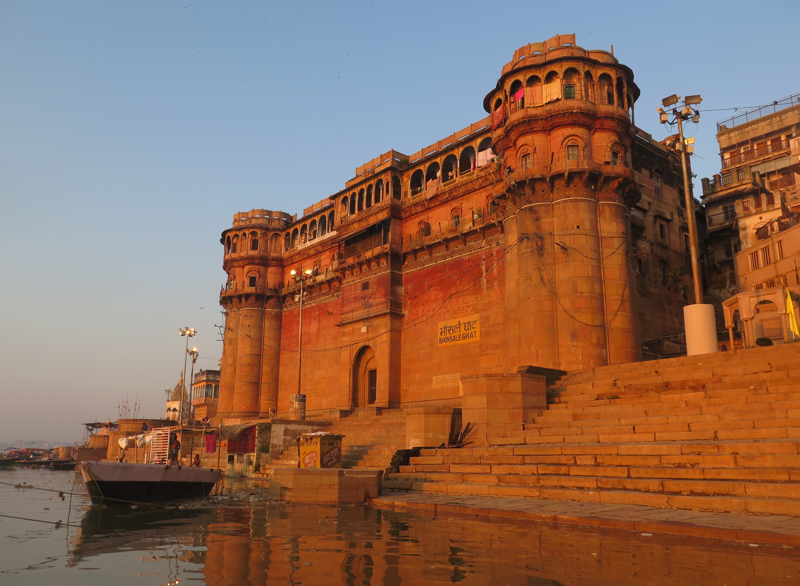
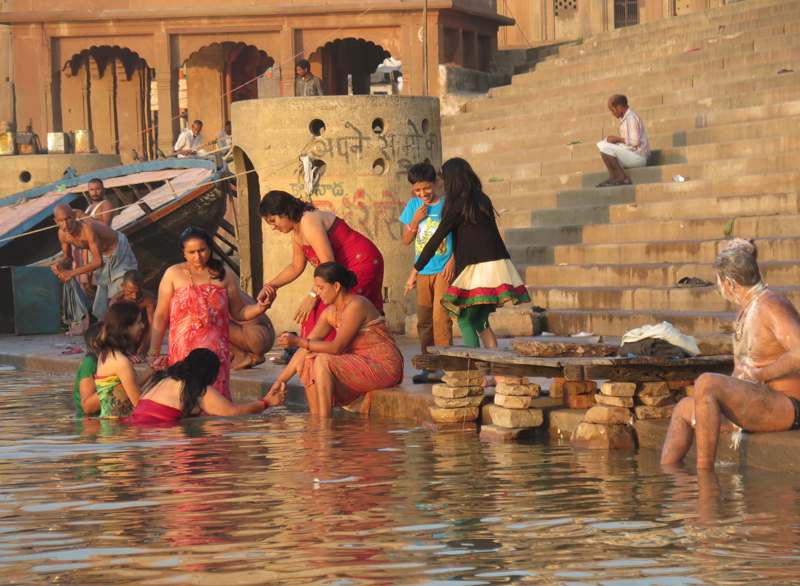
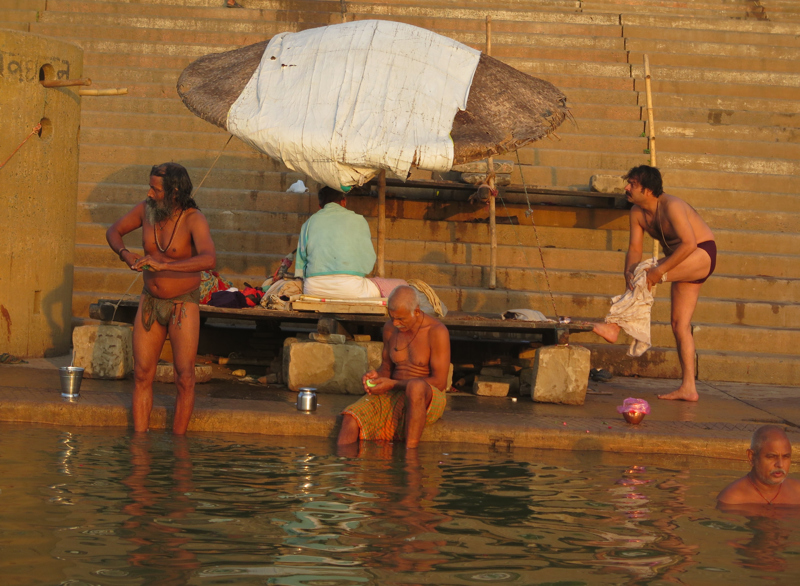
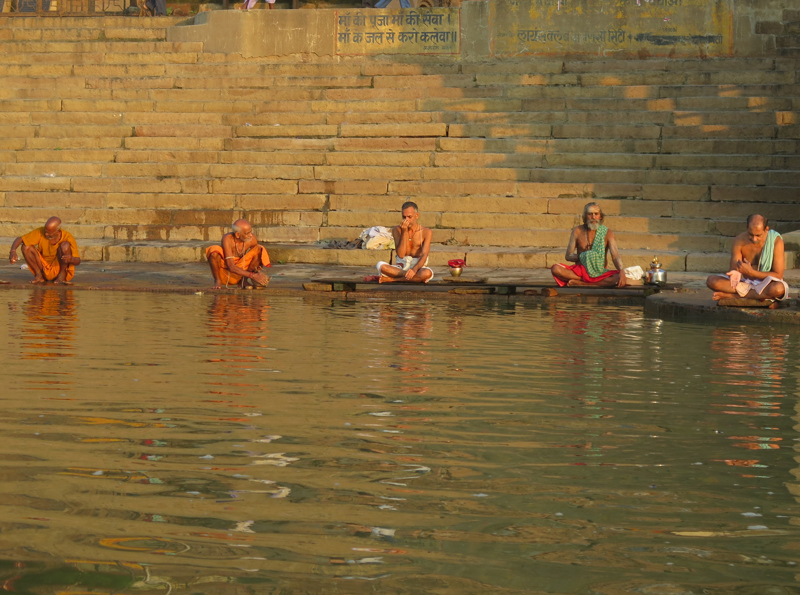
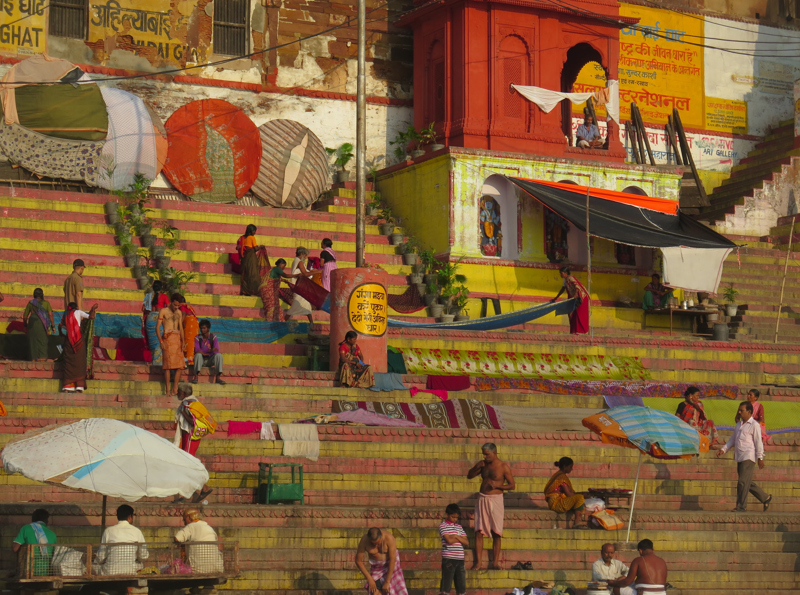
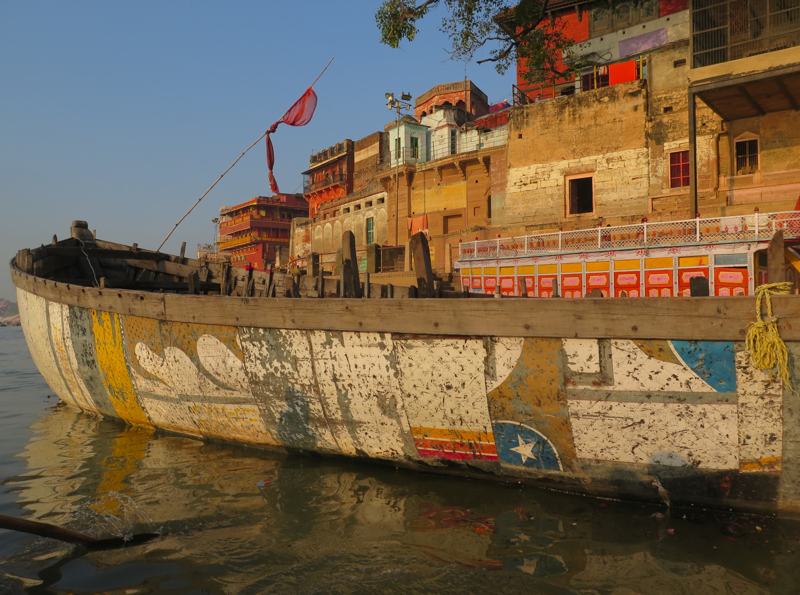
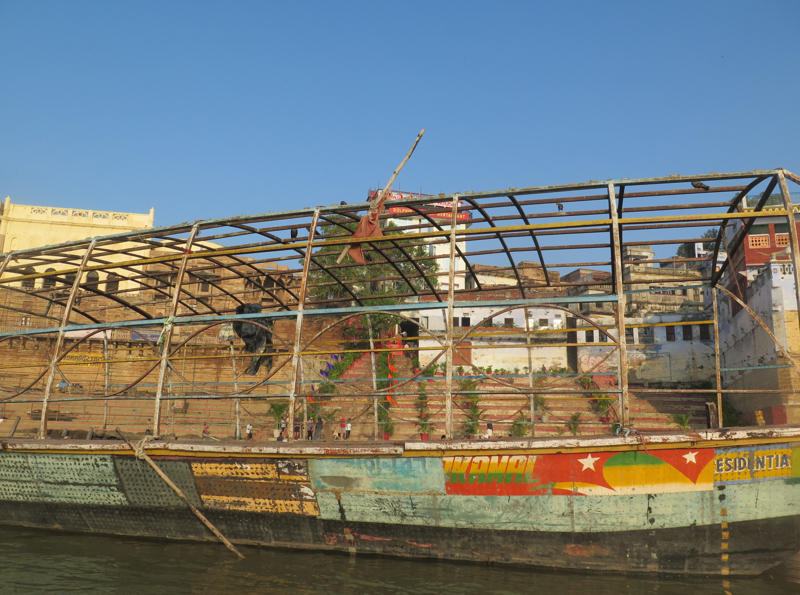
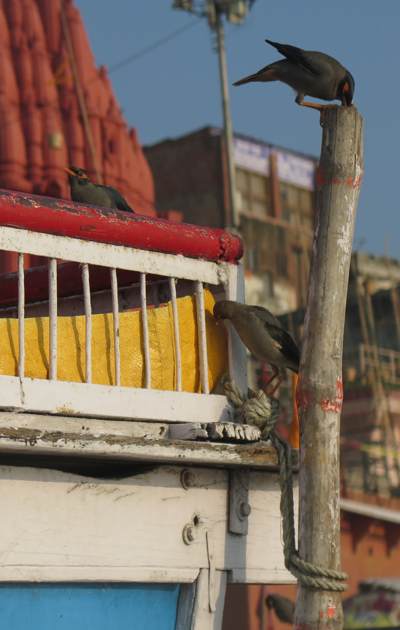
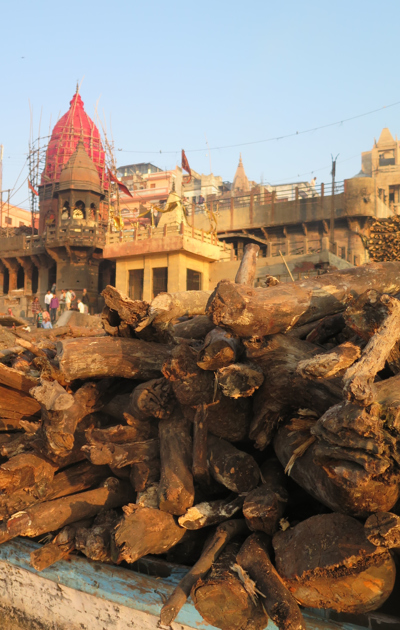
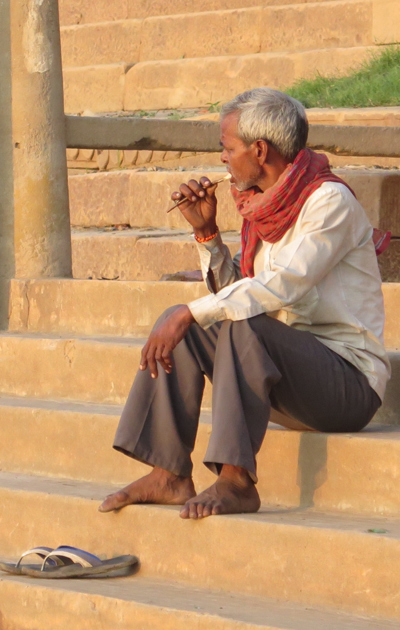
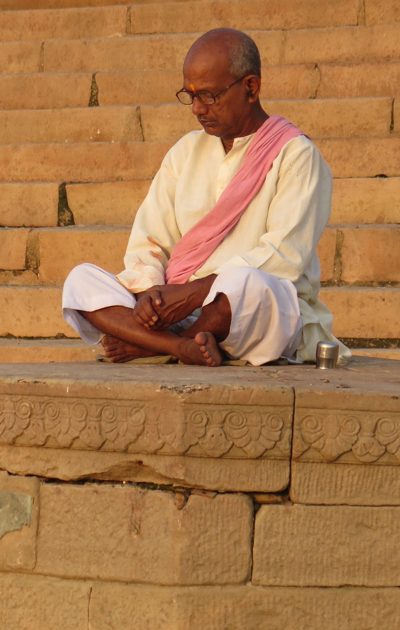
funerals from the previous day where the workers are busy setting up for today. One body is already being carried down the steps on a stretcher - a mummy wrapped in orange material. I watch the untouchables, destined to wash dead bodies, with pity, unable to imagine the effect this daily activity would start to have on my dreams were I in their position.
We eat lunch on Shanti's rooftop, entertained by the circling homing pigeons and the whooping calls of their masters. Two groups smash into each other in the sky and become momentarily bewildered, but they miraculously regroup following the cries of their owners. This is clearly a popular hobby in Varanasi.
Music classes are advertised in small instrument shops around the old town. We have booked an hour session for 3. Our attempt on the flute is slightly disastrous, so we move instead to the sitar. It's a beautiful
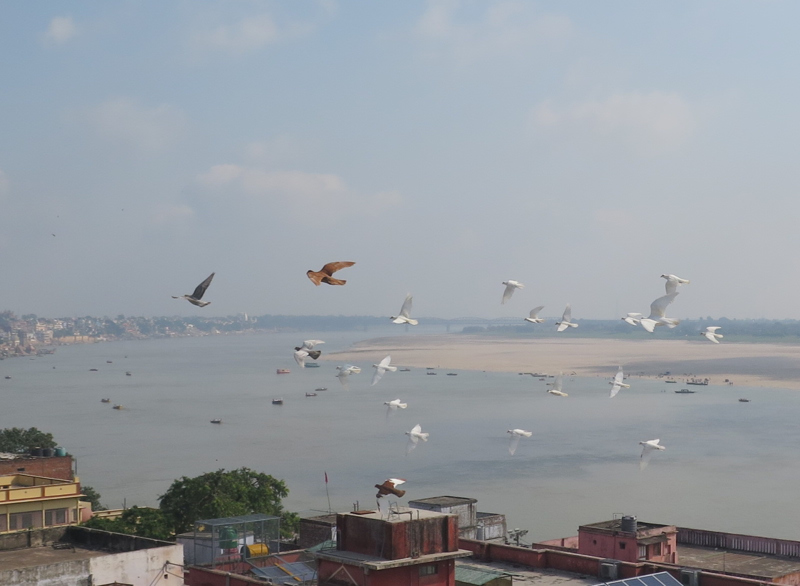
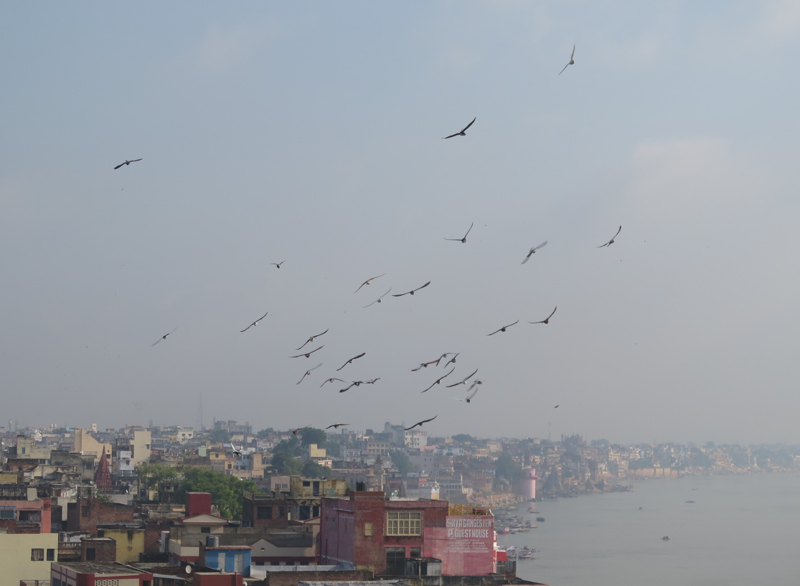
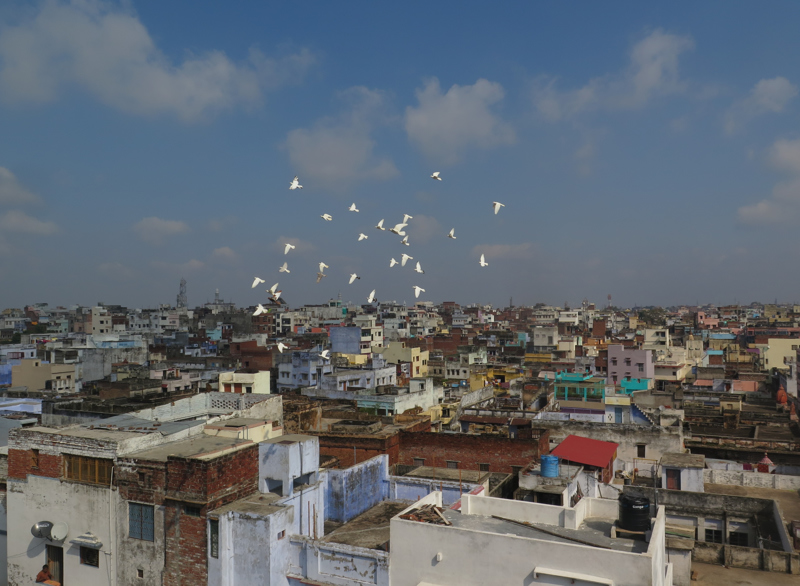
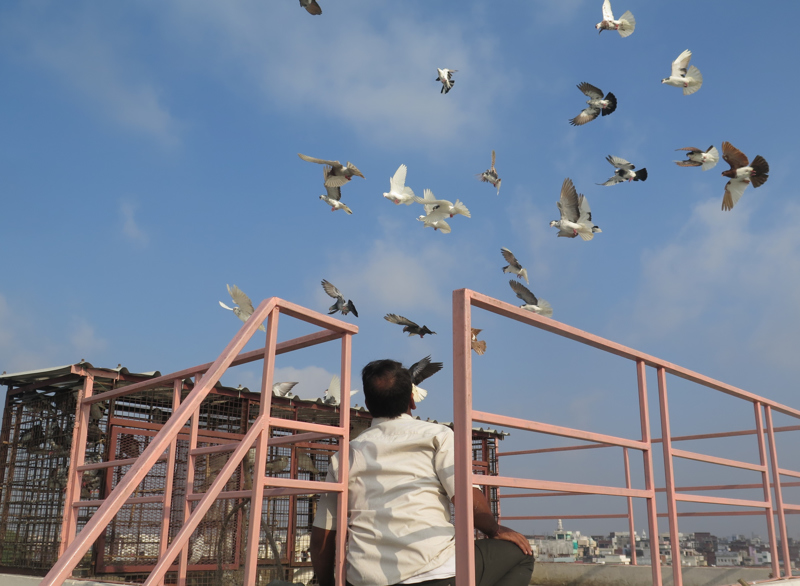
instrument, but we don't get much further than playing a simple scale. Val has fallen in love with the idea of the sitar as a piece of art to hang on her wall, so she spends the next hour contemplating this.
Due to train timings, we sadly have to leave Varanasi early evening, although we all wish we had another day to explore the chaos. There's two hours to spare, which should be time enough to visit the Golden Temple. To reach the entrance, we pass through a confusing network of market stalls. We're in a hurry so we ignore the clamour from vendors to view their wares. Soldiers guard the entrance. It's forbidden to bring in cameras or bags. The entry experience appears stressful, so Val chooses to stand outside with our bags. Only Hindus are permitted inside, so we have to declare our faith in order to gain entrance. The guards look disbelieving as they question us, but fill in the tourist log book using our passports and allow us to enter begrudgingly. We buy flowers as gifts to the deities and are ushered inside, following the line of pilgrims in front like groceries on a conveyer belt. We pass by a shrine inside a temple, where a female guard aggressively pushes against the small of Hannah's back so she is forced to bow submissively to the god to show her devotion and to drop the sacrificial gift into the well. The smooth stone floors are awash with a layer of water from a hosepipe to keep the floor clean - a constant battle against the footfall of so many people. It's a stressful rather than spiritual experience, and after our faith being questioned by a pilgrim inside, we're more than ready to leave. Val has been kept entertained by a man outside, who now kindly leads us out of the maze of passageways. He is one of many to have fallen in love with her beauty, her golden hair and white skin.
Val has decided to buy the ornate sitar. We have little time so we rudely interrupt someone's lesson. Val tries to lower the price, but makes a slip up by admitting she just wants to buy the sitar so she can hang it on her wall. The man looks distraught and makes her promise that she will play this instrument, as it was made for music not for decoration. They eventually strike a deal. We take a picture of the two men so we can identify them if the sitar doesn't turn up at Val's home, before running with our bags to find a rickshaw to the train station. I have been to India before, but never have I seen traffic as crazy as this. Bicycles, rickshaws, motorbikes fill every space in the road and it seems impossible that theses vehicles can move forward. Our tuk tuk driver honks his horn, squeezes through impossible spaces and accelerates aggressively in an attempt to ensure we catch our train, which is looking less likely by the minute, and we certainly don't wish him to risk any lives! At the train station, we have literally minutes before the train departs. I frantically ask passersby for the correct platform which is on the further side of the bridge. We make the train just before it leaves the station. We're hoping vendors will be selling food on the train, but none appear. Other passengers pull
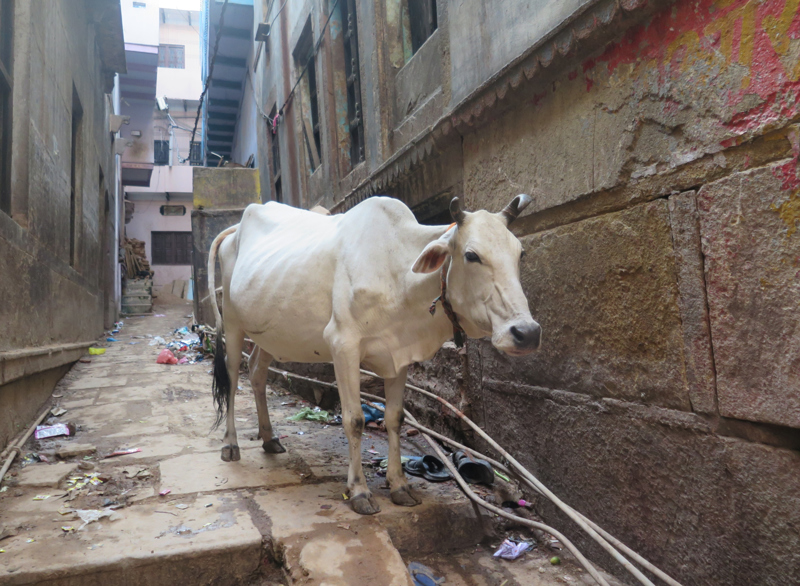
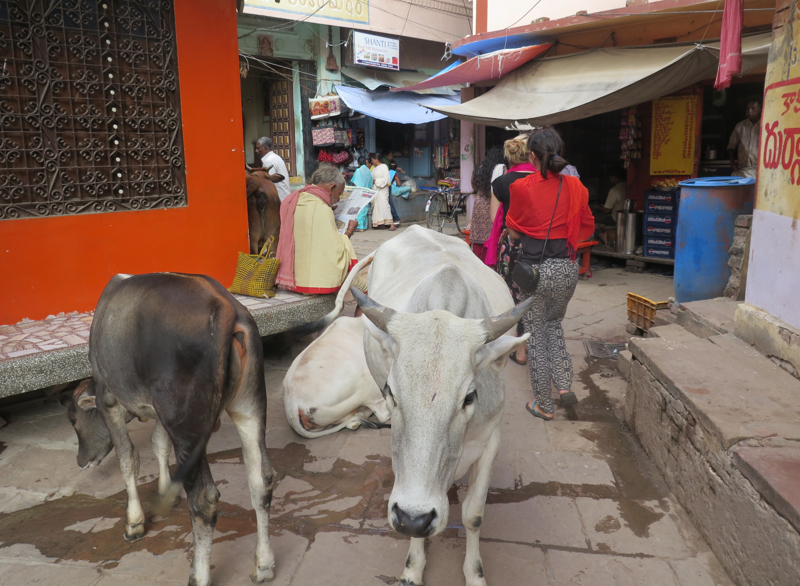
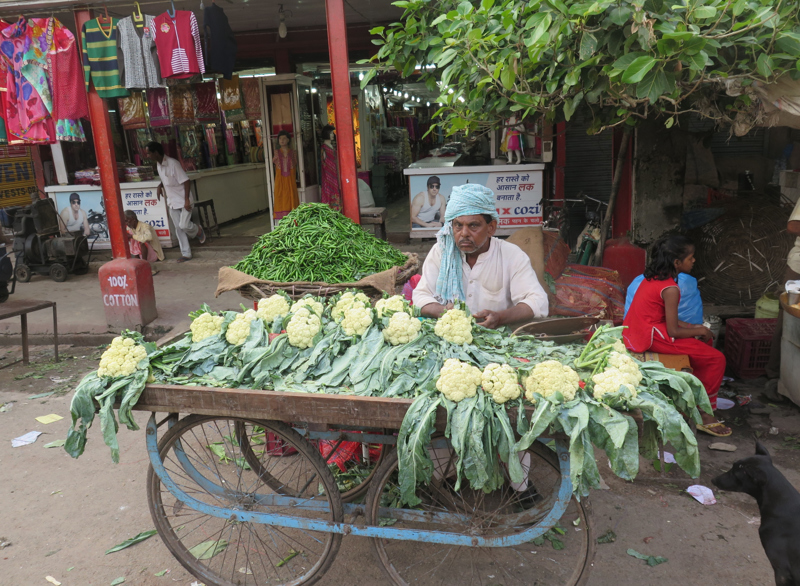
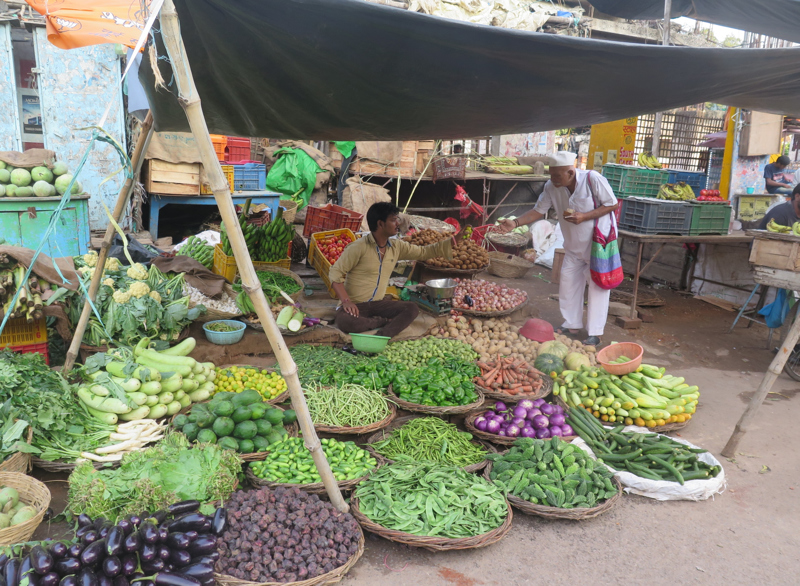
out dinner packets they bought previous to boarding. The train stops at a station where I jump off to buy water and crisps from the stall on the platform which will have to be our dinner tonight and jump back on as the train starts to pull out of the station. Fortunately, we've been seated with two French guys and a young Indian couple in love who are only interested in each other, so we are protected from staring eyes. I get a good night's sleep but Han and Val both wake in the morning with a cold from the window's draft and ceiling fans.
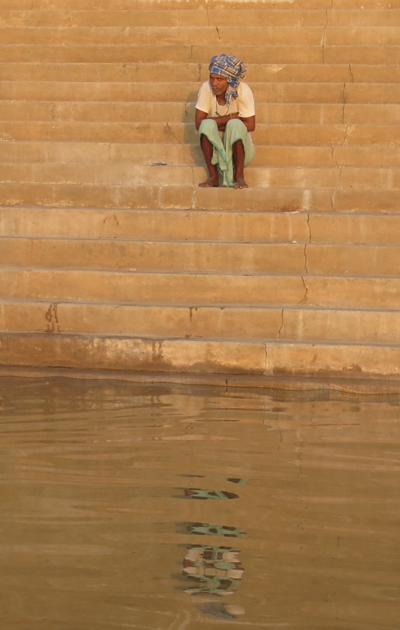
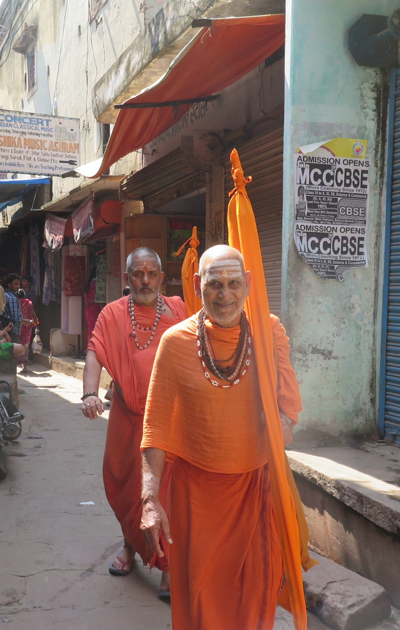
1.
Arrival in Jakarta, Pangandaran, Jogjakarta, Malang
2.
Volcanoes - Mt Semeru, Mt Bromo, Mt Ijen
3.
Ubud - a brief Sojourn
4.
Gilli Trawangan - white beaches and turquoise waters
5.
Boat Cruise - past the Komodo Dragons
6.
Flores - traditional villages and Mt Kelimutu
7.
Kuta, Lombok
8.
Baliem Valley - trekking in the mountains and meeting the Dani tribes
9.
Sentani - the festival and the lake
10.
Tana Toraja - Funerals and Burial Sites
11.
Kuala Lumpur - back in civilisation
12.
Cameron Highlands - trekking and tea plantations
13.
Georgetown, Penang - street art and crumbling mansions
14.
Banda Aceh and Pulau Weh - contending with Ramadan; Scuba Diving and snorkelling in paradise
15.
Lake Toba - the Batak people
16.
Bukit Lawang - Orangutans
17.
Unawatuna
18.
Volunteer Sri Lanka - Week 1
19.
Volunteer Sri Lanka Week 2
20.
Kandy and the East Coast
21.
Ella and Colombo
22.
Volunteer Sri Lanka - final week
23.
Earthbound Expedition - Kathmandu, Poon Hill and Chitwan National Park
24.
Back in Kathmandu
25.
Langtang - solo trekking
26.
Kathmandu to Varanasi